11 Best E-Commerce Platforms for Manufacturers in 2025

Global B2B e-commerce may hit $18.97 trillion by 2028 as manufacturers and suppliers turn to e-commerce platforms to optimize their operations, reach new markets, and drive growth.
Today, businesses have many e-commerce options, but to maximize online sales, they must select the right one.
Aureate has been helping manufacturers with eCommerce consultation, development, and maintenance for over ten years. Let’s explore the top e-commerce platforms for manufacturers that are more than just storefronts.
E-Commerce for Manufacturers: What Does It Look Like?
Buying and selling between businesses can be tricky. E-commerce platforms for manufacturers need to work well for both B2B (Business-to-Business) and D2C (Direct-to-Consumer) transactions, as well as the complexities associated with these models. When selecting an e-commerce platform, manufacturers should look for key features that address their unique needs:
- Advanced product catalogs to handle different products.
- Connection with ERP and other systems for smooth data flow.
- Customizable shopping cart, checkout, and customer accounts.
- Automated order management to reduce errors and handle workload.
- Easy customer shopping experience, with detailed product information, payment, and order tracking.
- Support for data analytics to understand sales trends, customer behavior, and product performance.
- Real-time inventory management, stock level monitoring, and automated reordering.
- Scalability to support business growth.
- Option for multiple storefronts for different customer segments or regions.
- Support for various payment methods for a smooth shopping experience.
What is the Best E-Commerce Platform for Manufacturers?
The best e-commerce platform for manufacturers can vary based on their specific needs, size, and resources. Some popular options are:
- Shopify – Best for manufacturers starting their online journey
- Adobe Commerce (Magento) – Best for large-scale manufacturers
- BigCommerce – Best for manufacturers looking for an all-in-one solution
- WooCommerce – Best for manufacturers already using WordPress
- Squarespace – Best for manufacturers prioritizing aesthetics and design
- Wix – Best for small manufacturers looking for an easy-to-use solution
- PrestaShop – Best for manufacturers looking for a free, open-source platform
- Commercetools – Best for manufacturers having complex businesses
- Yo!Kart – Best for manufacturers planning to build a multi-vendor marketplace on a budget
- Volusion – Best for manufacturers just starting with e-commerce and looking for a simple, affordable platform
- Salesforce Commerce Cloud – Best for a unified, multi-channel commerce experience
Top 11 E-Commerce Platforms for Manufacturers
1. Shopify

Shopify is a leading e-commerce platform that powers over 1.7 million businesses worldwide. Over the past decade, Shopify has become a global leader in e-commerce, empowering millions of businesses in over 175 countries—top brands like Gymshark, Kylie Cosmetics, SKIMS, Heinz, and more trust it.
Why is Shopify Best for Manufacturers?
Manufacturers can utilize Shopify’s advanced features for easier online store management. It simplifies the process of setting up an online store without coding knowledge, so it is ideal for manufacturers who are just starting.
Here’s how Shopify serves manufacturers:
- Centralized control over inventory, payment processing, and invoicing
- A wide array of tools to manage products effectively.
- Shopify Plus can handle a high volume of transactions, making it ideal for manufacturers looking to scale.
- Built-in SEO features and tools to help manufacturers improve their online visibility.
- Analytics and reporting tools provide valuable data to optimize store performance.
Pricing
Shopify offers several tiers. The pricing structure of its various plans is as follows:
- Basic Shopify: $19 per month (billed annually)
- Shopify: $49 per month (billed annually)
- Advanced Shopify: $299 per month (billed annually)
- Shopify Plus: $2300 Per month (on a 3-year term)
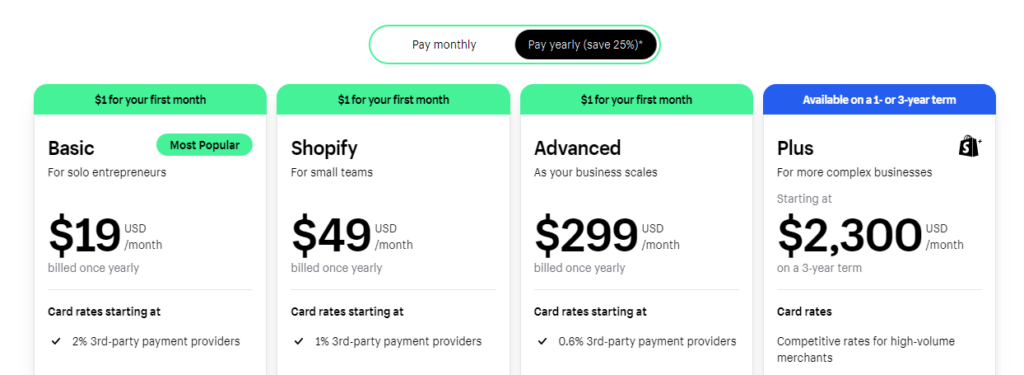
Pros
- Intuitive interface and no need for technical skills
- Can grow with your business, handling increased traffic and sales
- Robust security features to protect online transactions
- Extensive theme choices, third-party apps, and 24/7 customer support
Cons
- Higher fees when using payment gateways other than Shopify Payments
- May require professional help for significant design changes
- Some SEO capabilities might necessitate additional app purchases
- Shopify does not provide email hosting services
2. Adobe Commerce (Magento)
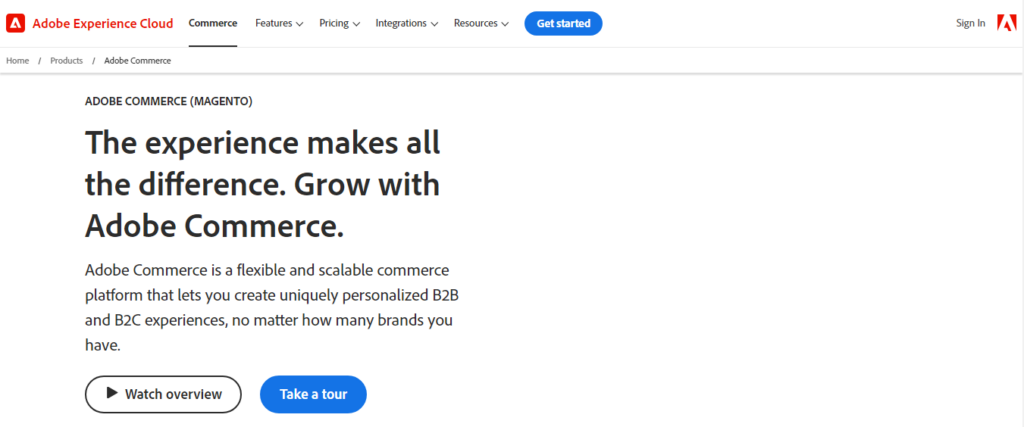
Adobe Commerce, powered by Magento, is a flexible and open-source e-commerce platform that allows businesses to create personalized B2B and B2C experiences. It hosts over 250,000 websites, including big-name brands like HP. Adobe Commerce is part of the Adobe Experience Cloud, a suite of products for creating personalized digital experiences across various channels and devices. The platform is known for its robust feature set, unparalleled customization capabilities, and extensive marketplace of extensions.
Why is Adobe Commerce Best for Manufacturers?
Adobe Commerce is a powerful platform that caters to the needs of manufacturers with its extensive integrations, intelligent workflows, and the ability to handle spikes in traffic.
Here are some key features that make Adobe Commerce a great choice for manufacturers:
- It offers intricate product options and customizations.
- It supports complex inventory needs across multiple locations and channels.
- It is equipped with B2B features like quote management, customer-specific pricing, and quick order forms.
- Offers more than 3,600 native integrations, covering numerous categories, including marketing, payments, security, customer support, site optimization, and shipping and fulfillment.
- Multi-language and multi-currency support facilitate international sales and operations.
- Designed to grow with your business, handling large product catalogs and customer databases efficiently.
Pricing
Adobe Commerce operates on a sliding scale based on the typical gross sales revenue of a company. The cost may be as low as $22,000 per year, but it can easily approach $100,000 per year for companies with a tremendous quantity of sales.
Prospective clients must contact Adobe directly for a personalized quote matching their business needs.
Pros
- Virtually limitless customization options
- Designed to handle large-scale online stores with thousands of products and high website traffic
- A vast marketplace of extensions and third-party integrations.
- A large global community of developers and partners.
Cons
- The platform’s advanced capabilities come with a steep learning curve.
- May require a dedicated team or service provider for maintenance and updates.
- Can be expensive, especially for small to medium-sized businesses.
- Requires proper hosting and optimization to maintain speed with large catalogs.
3. BigCommerce
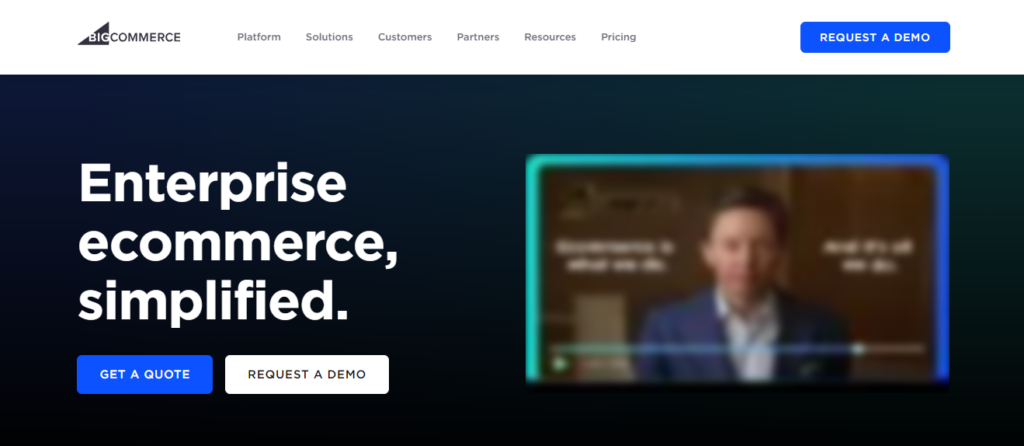
BigCommerce is a leading open SaaS e-commerce platform, launched in 2009, and has since become a leading platform for online retail and wholesale businesses. It focuses on B2B scenarios and is recognized as a popular solution for online B2B usage, powering close to 40,000 sites globally. BigCommerce is known for its robust features that cater to large catalogs and diverse product offerings, making it an ideal choice for manufacturers who require a powerful and scalable e-commerce solution.
Why BigCommerce is Best for Manufacturers
BigCommerce is an excellent choice for manufacturers due to its comprehensive set of features designed to meet the specific needs of B2B sellers. The platform offers a B2B Edition that transforms the shopping experience, providing modern online B2B shopping capabilities such as faceted search and API integrations.
Here are some features making BigCommerce ideal for manufacturers:
- The B2B Edition provides a sophisticated online shopping experience with features like faceted search and API integrations.
- Ensures that all transactions and customer data are protected with the highest security standards.
- Allows personalized pricing and marketing strategies, catering to different customer groups.
- Seamlessly integrates with major ERP, OMS, PIM, and CRM systems, creating an efficient and connected business environment.
- Capable of handling extensive product ranges with up to 600 SKUs per product, ideal for manufacturers with diverse offerings.
- An array of tools to improve online visibility and attract new customers through search engines.
- Multi-tenant SaaS architecture with open APIs allows extensive customization and integration with existing systems.
- Direct links to online marketplaces where many B2B buyers make purchases.
- Does not charge additional transaction fees.
Pricing
BigCommerce offers a variety of pricing plans to accommodate businesses of different sizes and needs:
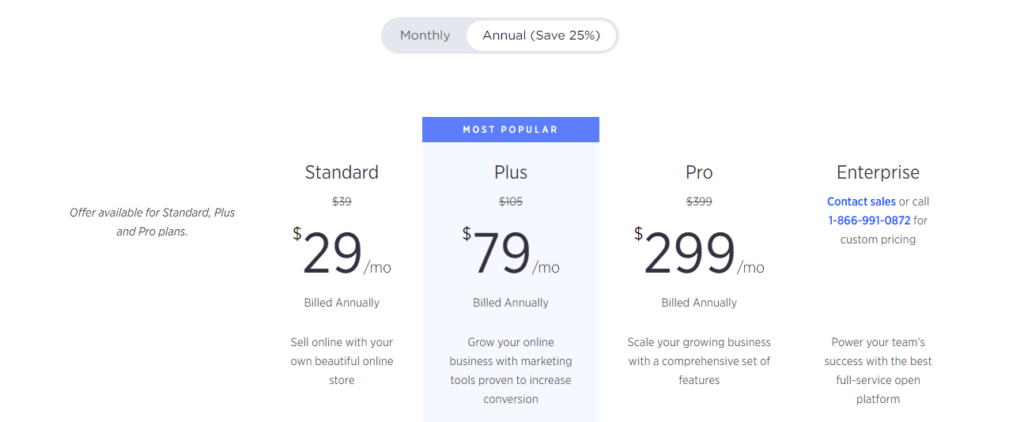
- Standard Plan: Starts at $29 per month
- Plus Plan: Begins at $79 per month
- Pro Plan: Priced at $299 per month
- Enterprise Plan: Custom pricing for larger businesses with specific requirements
Pros
- Provides a streamlined checkout process
- Supports multiple inventory locations, enhancing the management of products across different warehouses
- It does not charge additional transaction fees.
- BigCommerce allows unlimited staff accounts with all plans.
- Accurate shipping costs from various carriers in real-time.
- Round-the-clock support via live chat, phone, and tickets on all plans.
Cons
- Limits on annual sales volumes on its plans.
- Custom product filtering is only available with upper-tier plans.
- The platform may have a steeper learning curve for some users.
- Limited aesthetic variety in design templates may not suit all tastes.
4. WooCommerce
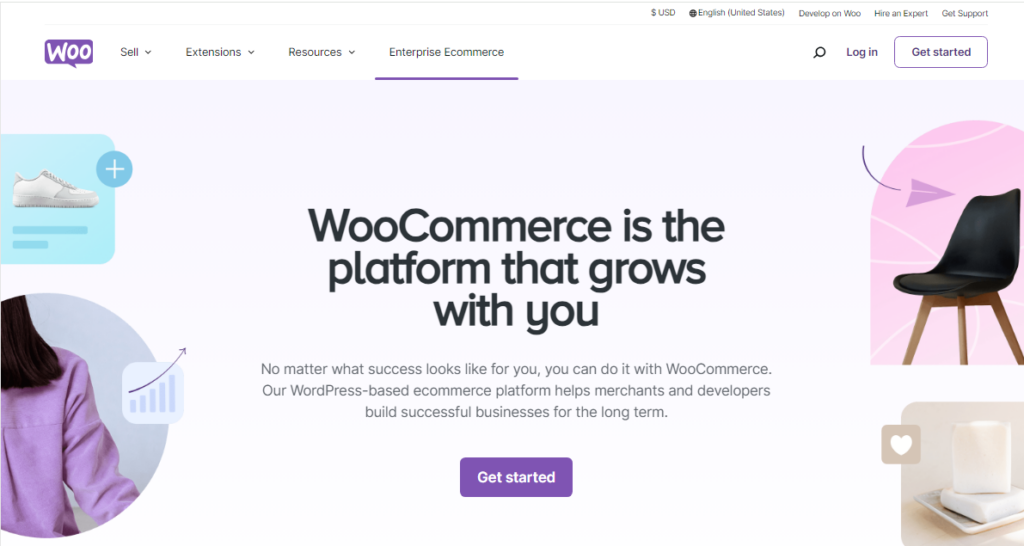
WooCommerce is a flexible, open-source e-commerce platform that integrates with WordPress. It’s primarily used by small to medium-sized online businesses and individual entrepreneurs. With its global reach and commitment to democratizing commerce, WooCommerce empowers over 3.9 million online stores.
Why is WooCommerce Best for Manufacturers
For manufacturers, WooCommerce provides great customization options and control over online stores. This platform works well for companies selling different types of products, including subscriptions and bundled items. Here are some important WooCommerce features that make it a good choice for manufacturers:
- Made for intricate pricing structures, specialized order workflows, and personalized product configurations.
- Easy setup wizard and product management.
- Integration with popular payment gateways for secure transactions.
- Flexible shipping methods and tax calculations.
- A vast library of plugins for enhanced functionality.
- Integration with various sales channels for increased reach.
- Strong community support, providing a wealth of resources and help for users.
Pricing
WooCommerce and WordPress are both free and open-source software. However, you will need to choose a hosting partner and purchase a domain name fee.
Pros
- The WooCommerce is free.
- WooCommerce is open-source software, allowing for tremendous flexibility in site design and functionality.
- It’s easy to make your online store mobile-friendly with WooCommerce.
- Being built on WordPress, WooCommerce benefits from robust SEO tools that can help improve search engine rankings.
- There are dozens of free WooCommerce themes available and thousands of paid themes.
Cons
- It only works with WordPress websites.
- Requires paid hosting.
- Regular updates are required to keep your WooCommerce store running smoothly.
- It can be difficult for beginners to learn.
- WooCommerce does not offer phone support.
5. Squarespace
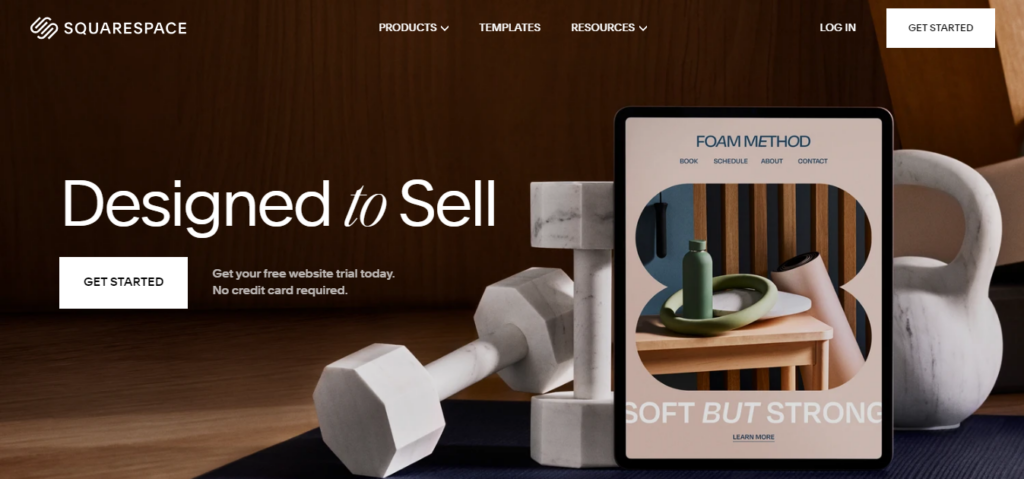
Squarespace is famous for its stunning website designs. Founded in 2003, Squarespace has grown to be one of the top choices for those looking to set up an online store. It powers millions of sites worldwide — over 2 million. Squarespace is part of the Adobe Experience Cloud, a suite of products for creating personalized digital experiences across various channels and devices.
Why is Squarespace Best for Manufacturers
Squarespace has easy editing tools, and flexible design templates, which are ideal for manufacturers who need to showcase their products effectively. The platform also includes strong booking and appointment features, ideal for manufacturers that offer services or consultations. Plus, Squarespace Commerce is available across many countries and currencies. This allows manufacturers to connect to customers globally.
Manufacturers can benefit from the following features on Squarespace:
- Match your store page to your brand, with options to change fonts, colors, and special features.
- Connect with payment processors like Stripe and PayPal to handle transactions securely.
- Utilize built-in marketing tools to attract and retain customers.
- Gain insights into visitor behavior and revenue with Squarespace analytics.
- Manage recurring revenue with subscription-based selling features.
- Organize your product catalog with drag-and-drop sorting tools, tags, and categories.
- Buy and print USPS shipping labels directly from the platform.
- Use Limited Availability Labels to inform customers of inventory levels.
- Create automatic discounts for orders or specific products.
- Unlimited storage and bandwidth on all plans
Pricing
Squarespace offers four pricing plans. The pricing structure of its various plans is as follows:
- Personal: $16 per month (paid annually) or $25 per month (paid monthly)
- Business: $23 per month (paid annually) or $36 per month (paid monthly)
- Commerce Basic: $28 per month (paid annually) or $40 per month (paid monthly)
- Commerce Advanced: $52 per month (paid annually) or $72 per month (paid monthly)

Pros
- Squarespace is highly user-friendly, with a drag-and-drop editor that simplifies website creation.
- Aesthetically pleasing templates suitable for various industries.
- Provides a CMS, domain registration, product selling, and analytics in one place.
- Multiple support channels are available, including 24/7 email support and live chat.
- Squarespace provides unlimited storage and bandwidth on all plans.
Cons
- It does not have phone support.
- Squarespace does not offer a free plan.
- Limited payment processing features compared to other platforms.
- Squarespace does not offer a free plan
- Once you choose a template, you cannot switch to another without starting over.
6. Wix
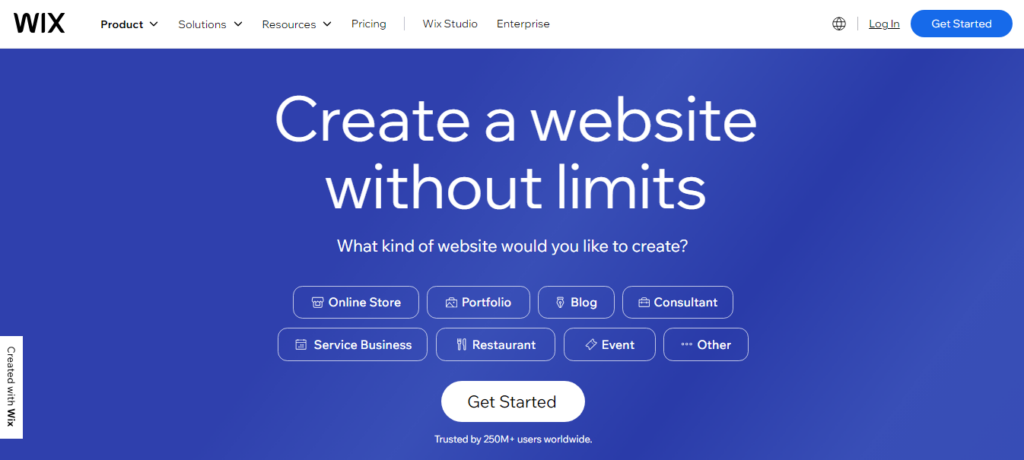
Wix is an all-in-one website builder that lets you quickly create attractive websites, even if you have no design or coding experience. Wix is popular among bloggers, entrepreneurs, and small business owners. As of now, Wix powers over 250 million sites worldwide.
Why is Wix Best for Manufacturers?
Wix can be a good choice for manufacturers for several reasons:
- Offers an intuitive drag-and-drop interface, making it easy for users with no design or coding experience to create attractive websites.
- Provides over 800 customizable templates suitable for various industries, including manufacturing.
- Includes built-in SEO tools to help improve your site’s ranking in search engine results pages (SERPs).
- Supports over 200 app integrations, allowing you to add advanced features to your website.
- Wix has evolved into a powerful eCommerce solution with features to handle everything from rich product listings to inventory management.
Pricing
Wix offers the following plans:
- Business Basic: $17 per month
- Business Unlimited: $25 per month
- Business VIP: $35 per month
- Enterprise: Custom pricing for larger businesses with specialized requirements.

Pros
- User-friendly drag-and-drop interface
- No coding experience required
- Built-in SEO tools
- More than 200 app integrations
- Multiple support channels, including 24/7 customer care
Cons
- Storage limits on all plans
- You can’t change templates once your site is live
7. PrestaShop
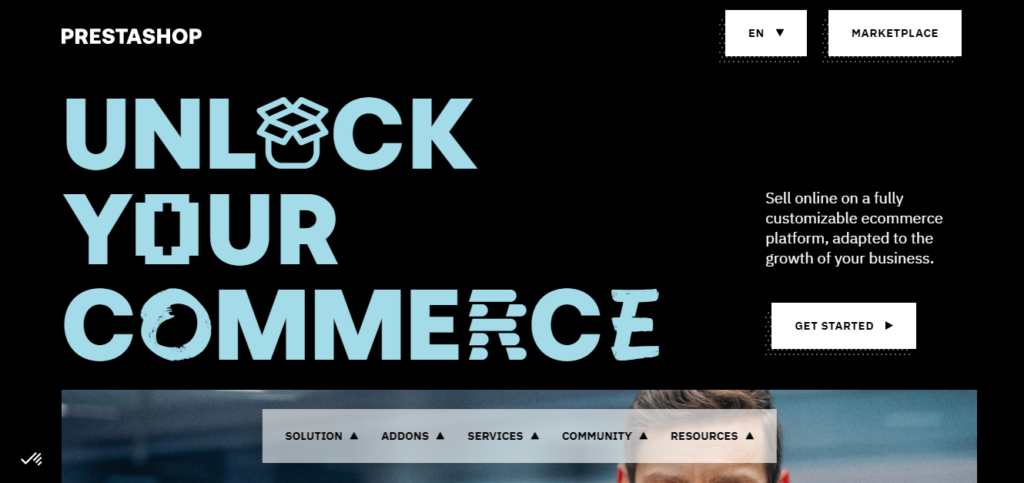
PrestaShop is a leading global ecommerce company serving customers in over 190 countries. It provides inclusive, customizable, scalable, and well-supported solutions, empowering entrepreneurs to own, control, and grow their online stores. As of now, over 300,000 merchants use Prestashop.
The platform has a strong community of over 1 million members, including developers and partners, who contribute to its continuous development and support.
Why is PrestaShop Best for Manufacturers
- Allows you to access all of their themes’ code and full customization to set your shop apart.
- Efficient tracking and management of inventory levels to ensure product availability .
- 100% free and can be used without add-ons and integrations.
- Unlimited product listings on PrestaShop, making it suitable for shops of any size.
- PrestaShop supports major payment gateways like PayPal and Amazon Pay and provides a free SSL certificate that is PCI-compliant for security.
- Built-in marketing features such as discounts, coupon codes, email marketing, limited-time offers, and free shipping.
- Multi-language and multi-currency support to serve customers worldwide.
- The platform grows with the business, handling large product ranges and high traffic volumes.
Pricing
PrestaShop is free to download and use. However, to run a well-functioning PrestaShop site, other costs must be considered:
- Domain Provider: You need to register a domain name, which costs around $10 to $15/year.
- SSL/TLS Certificate: To ensure data security, an SSL/TLS certificate is required, which costs between $5 to $1,000/year.
- Server Services: Depending on the type of server service chosen, the cost can range from $5 to $5,000/month.
- Add-ons and Modules: Depending on your store’s specific needs, you may need to purchase several add-ons and modules.
Pros
- Supports several major payment gateways
- Free SSL certificate
- Unlimited product listings
- 100% free to download
- Extensive customization option
- Over 300 built-in features for efficient product showcasing and management.
- Available in multiple languages
Cons
- Requiring technical knowledge and experience
- The design lacks a professional touch
- Significant costs for add-ons, themes, and hosting
- Official support is less extensive
8. Commercetools
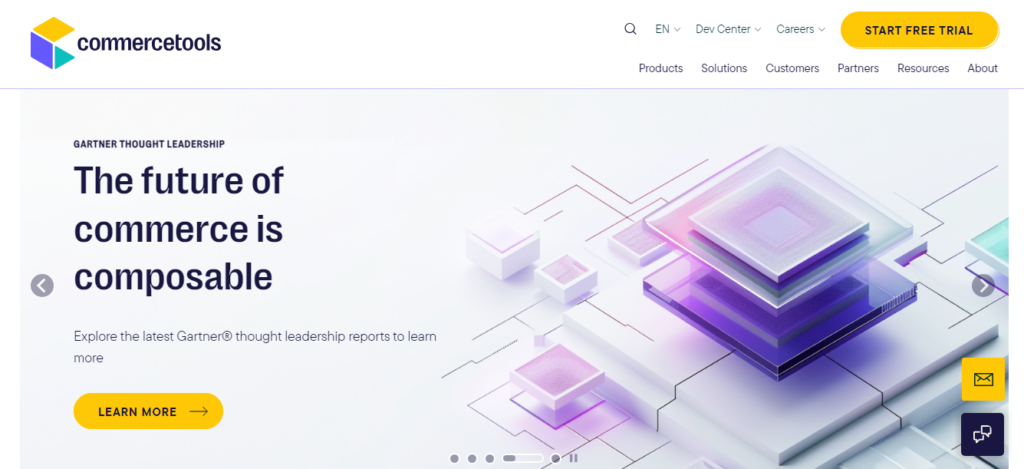
Commercetools is a visionary in the modern MACH (Microservices-based, API-first, Cloud-native, and Headless) architecture movement. It is an omnichannel eCommerce platform with additional functionality like point-of-sale through cloud deployment. Commercetools has established itself as an industry-leading eCommerce software provider, giving companies the agility to innovate and iterate on the fly, merge on and off-line channels, drive revenue, and future-proof their business.
Why is Commercetools Best for Manufacturers
Commercetools stands out for manufacturers due to its innovative tech stack and API-first architecture, which provide the agility and flexibility needed to adapt to rapidly changing market demands and customer expectations.
The headless commerce approach separates the front-end presentation layer from the back-end e-commerce functionality, allowing manufacturers to create unique and tailored front-end experiences for different channels and devices. The platform is extremely good when your business is complex, and you would like a well-fit solution.
Key features for manufacturers on Commercetools include:
- commercetools provides a composable commerce platform, giving companies all of the components required to build and run outstanding shopping experiences.
- Allows you to run multiple brands, expand to new markets, bring in new channels, and even try out business models with ease.
- Commercetools allows you to optimize your commerce investment and stop paying for features, systems, and processes you don’t need or that don’t drive value for your business.
- Native B2B-specific feature set, manufacturers can optimize customer experiences from discovery to multi-layered approvals, ordering, and fulfillment.
Pricing
Commercetools offers a fully functional 60-day free trial. After the trial period, the pricing is customized based on the specific needs of the business.
Pros
- Easy to use and well-documented
- Unified commerce platform
- Cloud-native, making it infinitely scalable
- Enables manufacturers to offer personalized experiences to their customers.
- Supports international expansion
Cons
- To fully set up commercetools, you might need a developer team.
- Its business model can make expense planning a challenge.
- Integrating with existing systems and third-party services may require additional planning and resources.
9. Yo!Kart
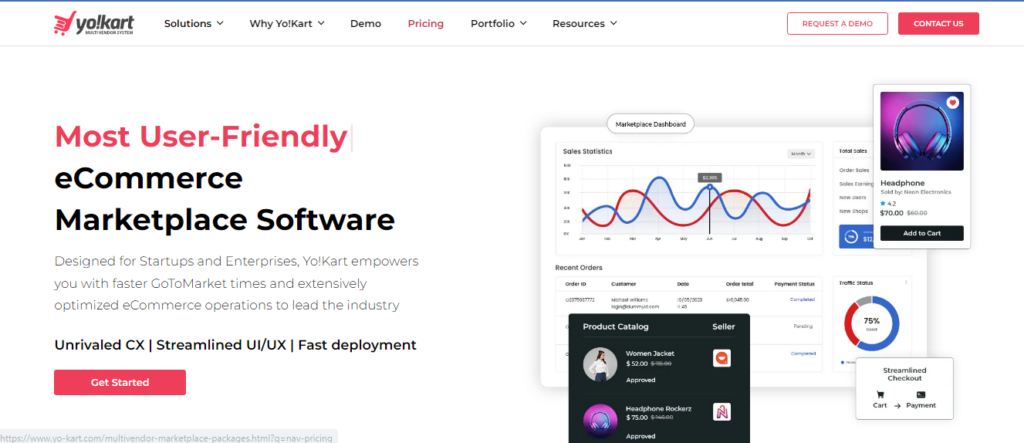
Yo!Kart is a cloud-based, multi-vendor e-commerce solution that helps users create a marketplace similar to Etsy or eBay. It supports an unlimited number of vendors and products. As of now, yo!kart has earned the trust of more than 2000 entrepreneurs and billion-dollar organizations alike.
yo!kart is developed on the Linux, Apache, MySQL, and PHP (LAMP) stack. Each component within the LAMP stack is open source, contributing towards making it secure, stable, and affordable.
Why is yo!kart Best for Manufacturers
Yo!Kart is an ideal platform for manufacturers who are looking to establish a multi-vendor marketplace or expand their online sales channels. It provides a range of features specifically designed to cater to the complex needs of manufacturers and their online operations.
Key features for manufacturers on Yo!Kart include:
- Fully customizable user interface.
- Efficient product showcasing, inventory management, and order processing are made easy with integrated tools.
- The platform supports multi-vendor selling, enabling manufacturers to collaborate with other sellers and expand their product range.
- Responsive design for mobile users and feature-rich mobile apps for Android and iOS platforms ensure a complete digital experience.
- Built-in SEO and marketing tools.
- Integration with leading payment gateways
- Instant tracking of sales, inventory data, and social media analytics for informed decision-making.
- yo!kart is inherently multi-vendor, making it suitable for enterprise use.
- It does not depend on third-party applications, giving you the freedom to customize yo!kart strictly as per your business requirements.
- yo!kart is a self-hosted solution, giving you complete control over different aspects of infrastructure, better security, flexibility to improve uptime, and more.
Pricing
Yo!Kart offers a one-time pricing model across the following plans:
- GoQuick Lite: $499
- GoQuick: $1249
- GoCustom: $6249
- GoCustom Prime: Request a Quote
Each package comes with a lifetime license, source code ownership, and up to 1-year free technical support.

Pros
- Fully Customizable
- High Scalability
- Comprehensive Feature Set
- User-Friendly Interface
- Excellent customer support
Cons
- Implementing and managing the platform may require a certain level of technical knowledge and expertise.
- Advanced customization may require additional planning and resources.
- Integrating with third-party applications or services may require additional planning and support.
10. Volusion
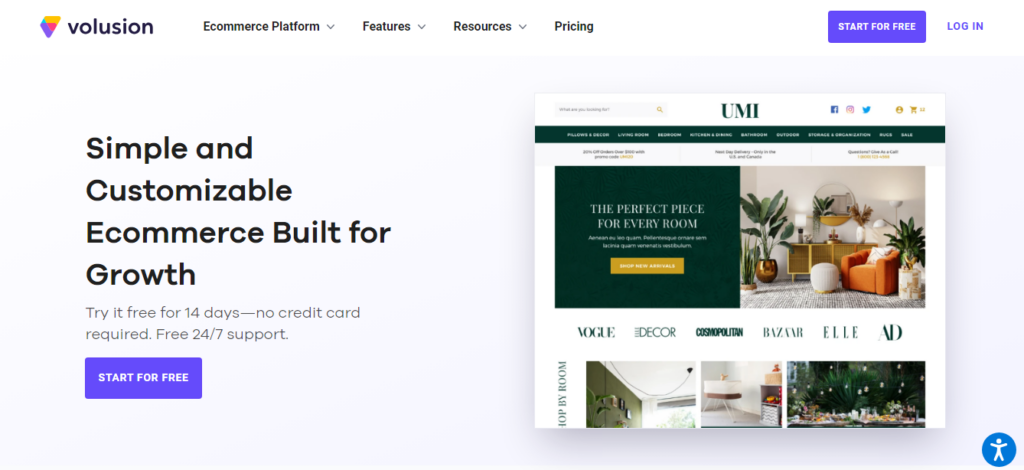
Volusion is a cloud-based ecommerce solution serving businesses since 1999. As of now, it maintains a decent market share, with around 30,000 online stores using it. Volusion focuses on providing a full toolkit for ecommerce owners who want a hosted solution. It offers site builders, shopping carts, marketing tools, order routing, inventory management, and reporting modules.
Why is Volusion Best for Manufacturers?
Volusion is a good choice for non-tech-savvy manufacturers looking
to sell directly to consumers or through a B2B model due to its straightforward user interface.
Key features for manufacturers on Volusion include:
- Volusion is known for its user-friendly interface, making it easy to create new products, pages, and categories.
- It is among the most affordable platforms for starter plans.
- The Volusion platform doesn’t charge transaction fees on their plans.
- Volusion works with over 30 payment gateways, including PayPal, Stripe, and Amazon.
- Volusion handles PPC accounts, creates and maintains ads, and provides weekly reports.
- With Volusion, you are allowed unlimited product listings.
Pricing
Volusion offers a range of pricing plans:
- Personal: $35/month, up to $50K annual sales
- Professional: $79/month, up to $100K annual sales
- Business: $299/month, up to $400K annual sales
- Prime: Based on GMV

Pros
- Easy-to-use tools
- Volusion does not charge transaction fees on any tier
- Powerful marketing and analytic tools
- Excellent customer support
Cons
- It is somewhat difficult to change the designs of the website
- Limited scalability
11. Salesforce Commerce Cloud
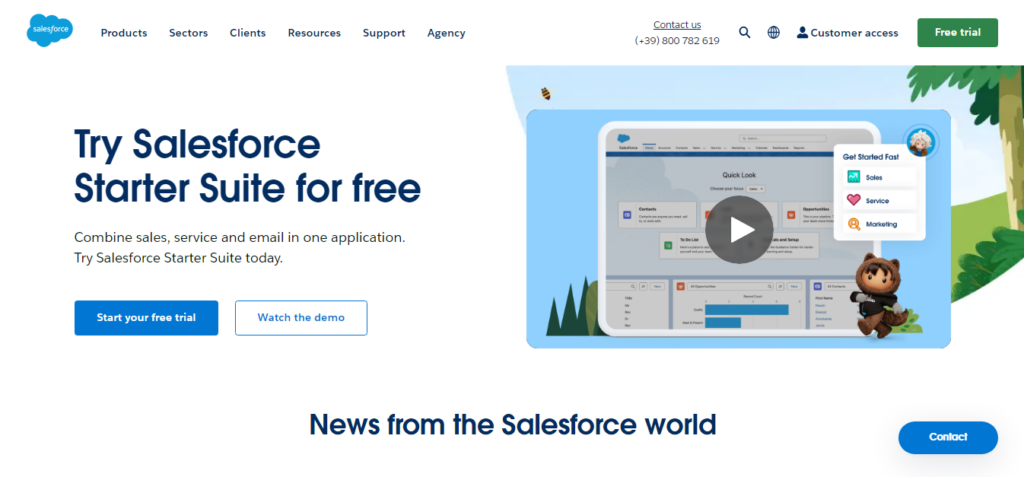
Salesforce Commerce Cloud is a cloud-based e-commerce solution for B2B and B2C markets. It is a part of the Salesforce Customer 360 integrated CRM platform that powers the entire suite of Salesforce-connected apps.
Salesforce Commerce Cloud has gained significant traction globally, with notable brands like L’Oréal, Guess, ECCO, Unilever, and Puma implementing it to enhance their e-commerce capabilities. Salesforce Commerce Cloud has distinct products for different market segments. It features built-in merchandising tools, such as sorting, filtering, and image zooming.
Why is Salesforce Commerce Cloud a Good Fit for Manufacturers?
Salesforce Commerce Cloud allows manufacturers to build and tailor websites for a specific group of customers who place big, regular, or repeat orders. For example, Salesforce B2B Commerce simplifies the process for wholesalers to order and restock their inventory.
Here are some key features of the Salesforce Commerce Cloud:
- Salesforce Commerce Cloud offers complete B2C, B2B, and B2B2C eCommerce functionality.
- It excels at handling large, frequent, or recurring orders.
- Features like account-specific pricing, quote requests, and automated reordering processes.
- Salesforce Commerce Cloud integrates seamlessly with complex inventory management systems
- The platform offers extensive customization options, allowing manufacturers to tailor their online stores to reflect their unique brand identity and product lines.
- Integration with Other Salesforce Products
Pricing
Salesforce Commerce Cloud operates on a revenue-based pricing model, which means the cost is tied to the customer’s gross merchandise value (GMV) or online revenues.
Pros
- Scalable and robust platform for large businesses
- Dedicated B2B Commerce features
- Handles large and recurring orders efficiently
- Integrates with complex inventory management systems
- Highly customizable
Cons
- Higher cost compared to other platforms
- Requires more technical expertise to set up and maintain
How You Should Choose the Right E-Commerce Platform
To choose the right e-commerce platform for your online store, you should ask the right questions. These questions will help you find a platform that meets your current needs and can also grow with your business:
- Can the platform handle your current and future sales volume?
- Does it offer functionalities like customer quotes, tiered pricing, and bulk order capabilities?
- Does it have robust inventory management tools to track stock levels and manage complex product variations?
- Can it handle rich product data with specifications, downloads, and technical details?
- Does it meet industry standards for data security and B2B transactions?
- Is the platform user-friendly for your team and customers (especially B2B buyers)?
- Does it integrate with your existing business systems (e.g., CRM, ERP)?
- What is the total cost of ownership, including monthly fees, transaction fees, and development costs for customization
How Can E-Commerce Benefit Manufacturers?
E-commerce offers several significant advantages to manufacturers:
- E-commerce automation increases efficiency by reducing manual tasks and errors.
- It allows for 24/7 operations, improving order management and customer service.
- Automation enhances customer experience with personalized communication and timely responses.
- It enables scalability, handling increased demand without additional resources.
- Direct customer engagement through e-commerce leads to higher profit margins.
- Access to global markets and talent pools drives innovation and competitive advantage.
- E-commerce platforms offer real-time inventory management and dynamic pricing.
- Marketing automation tools like Klaviyo and Magento segment customers for targeted campaigns.
- Data analytics from automation provide insights for better decision-making.
- Automation software saves significant time, converting manual workflows into automated tasks.
- Integration with existing systems is facilitated by open APIs and customization options.
- E-commerce automation is critical for future-proofing businesses in a digital marketplace.
What are Manufacturers’ Concerns about E-Commerce Adoption?
Manufacturers often hesitate to adopt e-commerce due to several concerns:
- Manufacturers face technical challenges integrating e-commerce with existing ERP systems.
- Scaling the business while managing the supply chain is a complex task.
- Inventory management and fulfilling orders efficiently can be daunting.
- Freight movement restrictions and optimizing last-mile delivery pose significant concerns.
- Data inconsistency and managing data across platforms are overwhelming challenges.
- Cybersecurity threats like data breaches and credit card fraud are major concerns.
- Trade wars, border issues, and emissions regulations can impact e-commerce operations.
- Meeting customer expectations for a seamless online experience is challenging.
- Communication gaps between departments and reliance on legacy systems create inefficiencies.
- Adapting to shifting market demands and economic restructuring requires agility.
- Population growth in rural areas and wealth distribution changes require strategy adjustments.
Conclusion
Picking the right platform from our top options comes down to your business needs. Take your time and think about your priorities. Do you want something easy to use or lots of special features? Is cost a big factor or not so much? Once you know what you’re looking for, you can make a better choice.
Still trying to decide which platform to choose?
Contact Aureate for personalized ecommerce consultation and let our experts guide you to the perfect platform for your business.
Frequently Asked Questions
Is selling directly online a good idea for manufacturers?
Absolutely, selling online is a smart move for manufacturers. It lets you control your brand, reach more customers, and grow sales.
Which e-commerce type is used for manufacturers?
Manufacturers typically use B2B (Business-to-Business) or B2B2C (Business-to-Business-to-Consumer) e-commerce models. They sell directly to other businesses or through businesses to reach consumers.
How can manufacturers convert their offline store to an online store?
Manufacturers can convert their offline store to an online store by choosing an e-commerce platform from popular options, setting up their product catalog, and integrating payment and shipping options. They also need to plan for customer service and marketing strategies.
Transitioning from an offline store to an online one can be complex. It’s highly recommended to seek help from experts like Aureate for a smooth and successful migration.
Is it difficult to manage an e-commerce platform for manufacturers?
The difficulty of managing an e-commerce platform can vary. It depends on the platform chosen and the complexity of the business. However, many platforms are user-friendly and offer support and resources to help.
Do I need to be a tech expert to use an e-commerce platform?
No, you don’t need to be a tech expert to use an e-commerce platform. Most platforms are designed to be user-friendly. They offer tutorials, customer support, and community forums to assist users.
What is the cost of using an e-commerce platform?
No, you don’t need to be a tech expert to use an e-commerce platform. Most platforms are designed to be user-friendly. They offer tutorials, customer support, and community forums to assist users.
Can e-commerce platforms integrate with my existing manufacturing systems?
Yes, many e-commerce platforms can integrate with existing manufacturing systems. This can help streamline operations, improve inventory management, and enhance customer service. It’s important to check the integration capabilities of a platform before choosing it.






Post a Comment
Got a question? Have a feedback? Please feel free to leave your ideas, opinions, and questions in the comments section of our post! ❤️